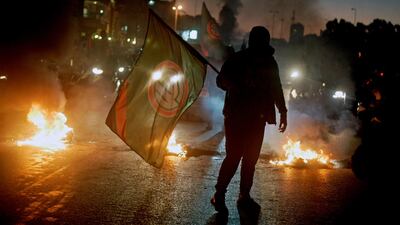A pan-Arab economic summit to be held in Beirut later this week is becoming increasingly mired in controversy as Libya announced it will boycott the session and Lebanese allies of the Syrian government threaten to derail the meeting if Damascus is not invited.
The 4th Arab Economic and Social Development Summit is scheduled to take place on January 19, but recent snags and the absence of a functioning Lebanese government have threatened to delay the session, which gathers member states of the Arab League.
Assistant secretary general of the body, Hossam Zaki, landed in Beirut on Friday to make sure that preparations are in place for the meeting to kick-off as planned.
But reports surfaced on Sunday night that Libya may boycott the meeting after Lebanon's Amal Movement, a political party led by the country's speaker of parliament, rallied to prevent Tripoli from participating in the session.
Speaker Nabih Berri last week said he is opposed to Libya attending the summit in Beirut and even urged for the session to be postponed, flaring up tensions with the committee overseeing preparations for the summit – formed jointly by the presidential palace and the Arab League's Secretariat General.
Ali Khreis, a lawmaker and member of the Amal Movement said on Friday that the Libyan delegation will be forbidden from leaving Lebanon's airport.
"The Libyan delegation may arrive at the airport but it will surely not be capable of entering Lebanon," he told the Chinese Xinhua news agency, one day after local media reported plans by the Amal Movement to block the airport road ahead of the summit
At the heart of tensions between the Amal Movement and the Libyan state is the case of praty founder and cleric Musa Al Sadr who went missing in 1978 on a trip to Libya at the invite of then leader Muammar Qaddafi.
__________
Read More:
Assad’s allies in Lebanon are pushing for Syria's return to the Arab League
Analysis: Return of UAE mission to Damascus suggests Gulf states want a say in Syria's future
Musa Sadr and the 40-year disappearance that landed Gaddafi’s son in prison
_________
The Amal Movement has maintained that the Libyan state has been uncooperative with attempts to uncover the fate of the revered cleric. Qaddafi’s son, Hannibal, is standing trial in Beirut in connection to the disappearance, despite being a toddler at the time.
Then, over the weekend, a video being shared across social networks showed members of the Amal Movement removing the Libyan flag from a pole near the planned venue for the summit and replacing it with a party flag instead.
Protesters in Libya on Monday responded to the incident by attacking Lebanon's embassy in Tripoli, Lebanese Ambassador Mohammad Sukaina said. Speaking to local media, he said that angry mobs gathered around the embassy's main gate and tore down the Lebanese flag and replaced it with a Libyan one.
The flag incident has now led to a diplomatic stand-off.
Libyan Foreign Minister Mohamed Taher Siala said on Sunday that his country would not send delegates to the summit given the public anger.
Libya's High Council of State also released a statement calling on the foreign ministry to freeze diplomatic relations with Lebanon until Beirut can guarantee such an incident will not take place again.
However, Rafik Shalala, a spokesman for the committee planning the summit, said on Monday that Libya has yet to inform them of its official decision regarding attendance.
While the Libyan stand-off is the most visible of obstacle, the conference has caused other local storms in Beirut.
The issue of Syria's participation has also sparked anger. The summit's organisers have already announced that Syria would not be invited despite talks of readmitting them to the Arab League.
However, Lebanese allies of President Bashar Assad, including Hezbollah and the Amal Movement, are pushing for Syria to attend, seeing it as a gateway to restoring the country's membership.
Both Hezbollah and the Amal Movement last month released statements urging the Lebanese government to extend an invite to Damascus. Now, they pushing to postpone the summit until they can secure the invitation.
However, in comments to Sputnik on Saturday, Mr Zaki said: "The League has no plans to discuss an invitation to the body's summit in Tunisia during the upcoming meeting in Lebanon to which Damascus is not invited either."
Another concern is the fact that Lebanon currently does not have a government.
Lebanon has been without a cabinet since parliamentary elections were held in May.
Political horse-trading and disagreement over cabinet posts and portfolios have led to a political gridlock that has threatened financial and economic stability in the country.
Politicians have called for the summit to be delayed until there is a new cabinet.

